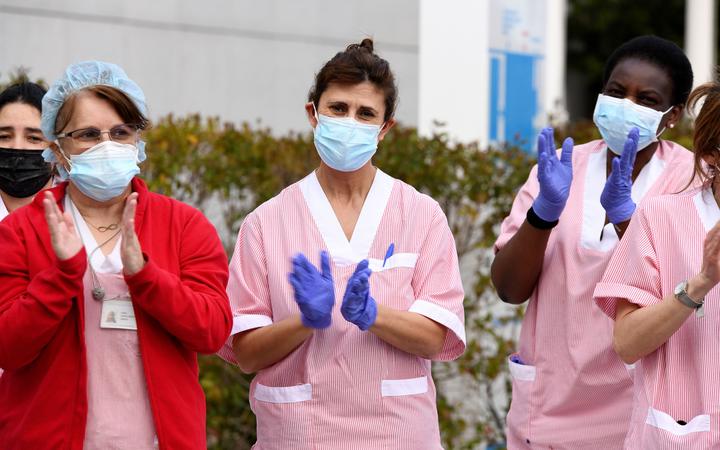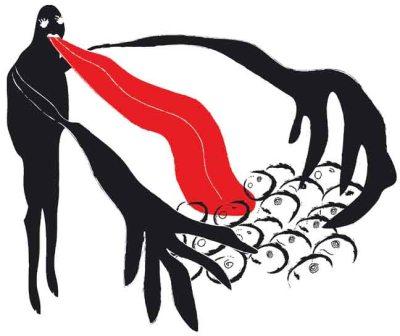In the wake of the COVID19 outbreak, we are confronted with a globally massive threat to our health, where unparalleled measures are being proposed and enacted to counter it. We are chronicling in real-time the heroic actions of those in the field who are putting their lives on the line to make a difference coupled with heartbreaking stories of loss, separation, and suffering.
Medical personnel on the frontlines of this pandemic in my home country Spain are succumbing to illness at an astonishing rate. Currently, Spain is hobbled with the highest COVID19 caseload in all of Europe and reportedly ranks only behind the United States worldwide in terms of sheer numbers of those infected.



 The semester is about to start and I find myself touching up syllabi and putting some order in my course material. While reviewing files, I came across a very helpful handout from a
The semester is about to start and I find myself touching up syllabi and putting some order in my course material. While reviewing files, I came across a very helpful handout from a  There are many that contend today that the Holocaust’s global presence and iconic status obscures other forms of mass violence, and even the acknowledgment of other genocides. Elie Wiesel’s seminal role in Holocaust memorialization worldwide demonstrates exactly the opposite. The proliferation of Holocaust remembrance, education and research efforts has been extraordinarily influential in the moral and political debates about atrocities, and in raising the level of attention to past violence and responsiveness to present genocide and other forms of gross human rights violations.
There are many that contend today that the Holocaust’s global presence and iconic status obscures other forms of mass violence, and even the acknowledgment of other genocides. Elie Wiesel’s seminal role in Holocaust memorialization worldwide demonstrates exactly the opposite. The proliferation of Holocaust remembrance, education and research efforts has been extraordinarily influential in the moral and political debates about atrocities, and in raising the level of attention to past violence and responsiveness to present genocide and other forms of gross human rights violations. This volume offers a trans-national, comparative perspective on the varied reactions of the neutral countries to the Nazi persecution and murder of the European Jews. It includes a chapter by CHGS director Alejandro Baer and historian Pedro Correa entitled “The Politics of Holocaust Rescue Myths in Spain.”
This volume offers a trans-national, comparative perspective on the varied reactions of the neutral countries to the Nazi persecution and murder of the European Jews. It includes a chapter by CHGS director Alejandro Baer and historian Pedro Correa entitled “The Politics of Holocaust Rescue Myths in Spain.” In 1999 Joschka Fischer, Germany’s Foreign Minister and a member of the Green Party with strong pacifist roots, used the phrase “Never Again Auschwitz” to support German military intervention during the Kosovo crisis. In 2005, at the main ceremony to mark the 60th anniversary of the liberation of the Auschwitz camp, Russian President Vladimir Putin praised the Red Army for “liberating Europe” (an assertion that obviously did not resonate positively among Poles). In the summer of 2014 Turkish President Recep Erdoğan slammed Israel for betraying the memory of the Holocaust by “acting like Nazis” during the operation against Hamas in Gaza. At the same time Israeli Prime Minister Benjamin Netanyahu invoked the Holocaust to warn the world of a nuclear Iran.
In 1999 Joschka Fischer, Germany’s Foreign Minister and a member of the Green Party with strong pacifist roots, used the phrase “Never Again Auschwitz” to support German military intervention during the Kosovo crisis. In 2005, at the main ceremony to mark the 60th anniversary of the liberation of the Auschwitz camp, Russian President Vladimir Putin praised the Red Army for “liberating Europe” (an assertion that obviously did not resonate positively among Poles). In the summer of 2014 Turkish President Recep Erdoğan slammed Israel for betraying the memory of the Holocaust by “acting like Nazis” during the operation against Hamas in Gaza. At the same time Israeli Prime Minister Benjamin Netanyahu invoked the Holocaust to warn the world of a nuclear Iran. The Twitter account
The Twitter account